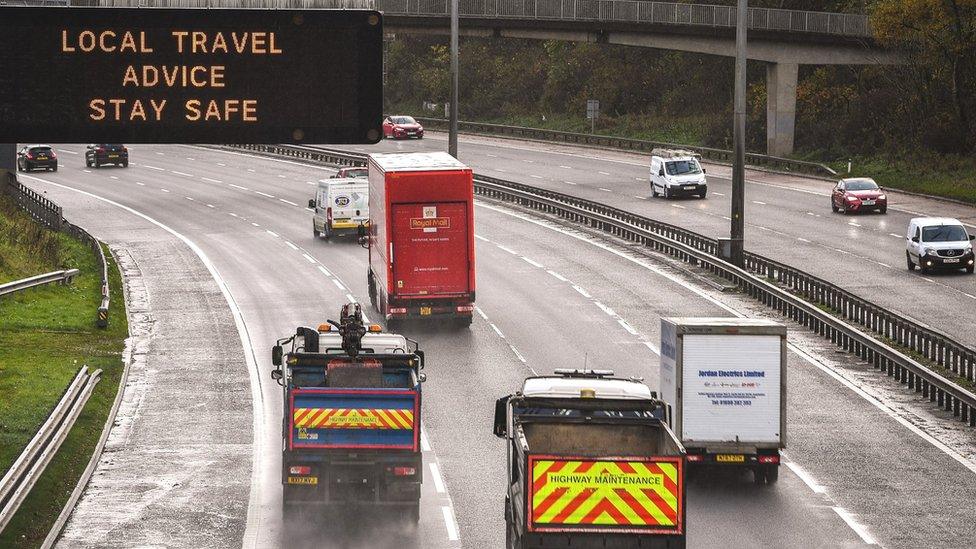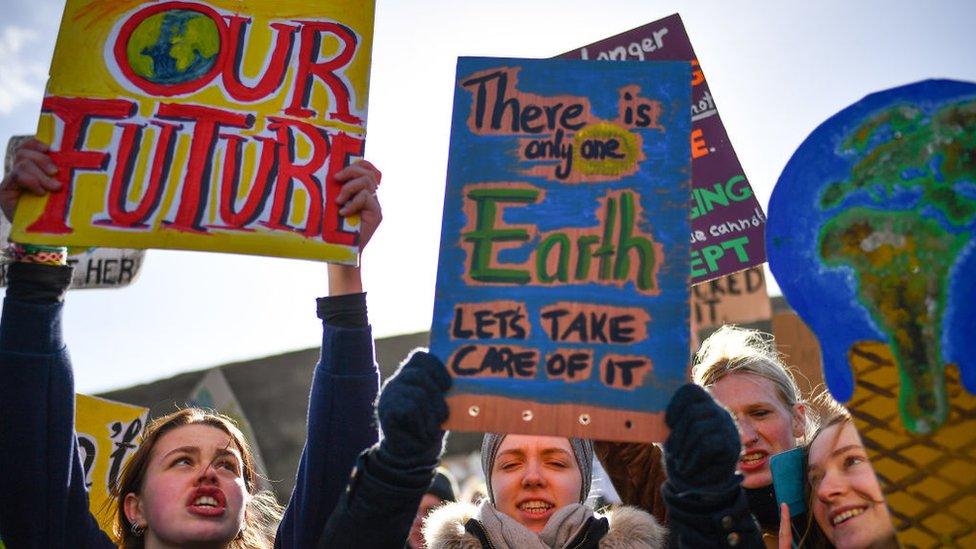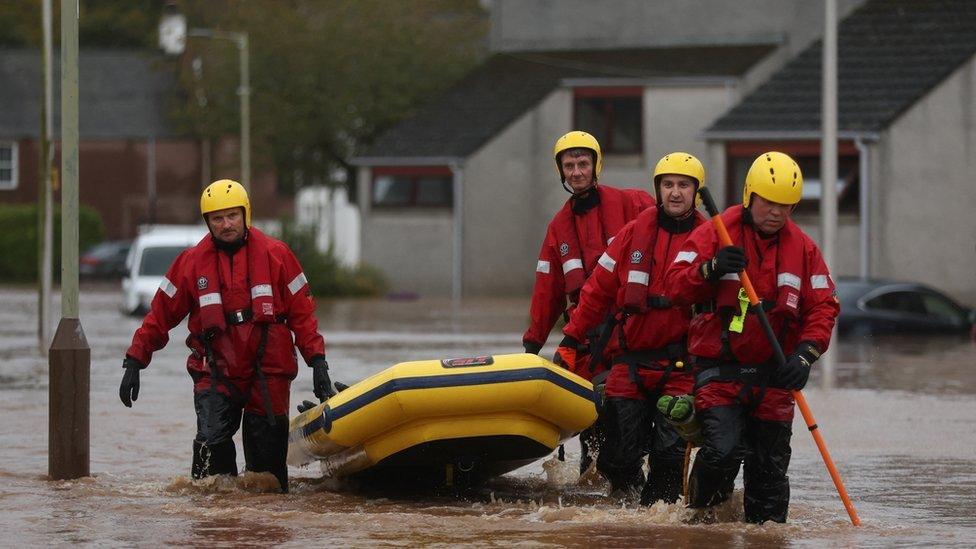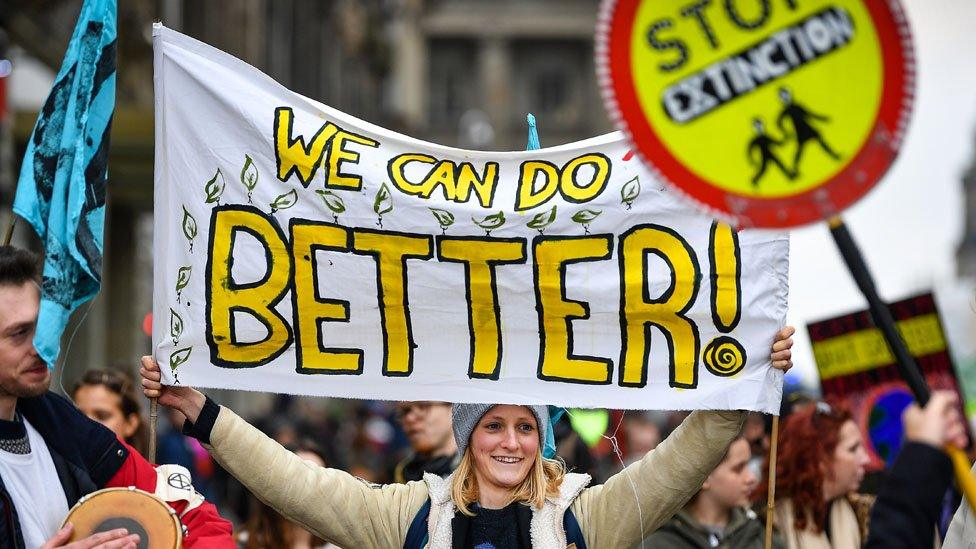Scottish government scraps climate change targets
- Published
- comments
Mairi McAllan told the Scottish Parliament that the government’s flagship 2030 climate change target is now "out of reach".
The Scottish government has confirmed it will scrap its annual and interim targets for cutting greenhouse gas emissions.
They will be replaced with a system measuring emissions every five years.
Ministers have announced a raft of measures to cut planet-warming gases including a national integrated ticketing system for public transport.
New legislation will be introduced similar to the carbon budgets used by the UK and Welsh governments.
The Scottish government insists the long-term target to reach net zero by 2045 "steadfastly" remains.
In a statement to the Scottish parliament, Energy Secretary Mairi McAllan accepted that the target of cutting emissions by 75% by 2030 was out of reach.
She said the government must act to chart a course to 2045 at a pace and scale which was feasible, fair and just.
Ms McAllan confirmed the Scottish government would bring forward expedited legislation to address matters raised by the Climate Change Committee (CCC), and ensure the legislative framework better reflected the reality of long-term climate policymaking.
More than a dozen flagship policies were wrapped around the announcement.
Ms McAllan said the Scottish government would help people become less reliant on cars and publish a "route map" to help deliver a 20% reduction in car use.

The energy secretary confirmed plans to reduce car use by 20%
In the statement, she said "small businesses and independent traders" would be at the heart of car-use reduction, and the government would also work with the farming community to continue producing food while lowering emissions.
She said the government would also work to more than quadruple the number of electric vehicle charge points across Scotland, with 24,000 additional charge points planned by 2030.
A previous Transport Scotland report, external cited an estimate by the CCC that the UK would need about 280,000 public charging points by 2030, implying a Scottish total of about 30,000.
A consultation on carbon land tax on the largest estates will be launched over the summer, she confirmed.
The energy secretary ended her statement by blaming UK budgetary restrictions for forcing the Scottish government to "try to deliver societal and economic transformation with one hand tied behind our back".
'Angry and disappointed'
During the questions that followed her statement, Ms McAllan said she was "disappointed herself" in the news, but said it represented a "minor" adjustment to the government's overall plans.
Scottish Greens co-leader Patrick Harvie said he was "angry and disappointed that we are in this position" and it must be a "turning point".
"We cannot undo decades of inaction and bad decision-making," he said.
"But what we can do is ensure that Scotland goes further and faster in delivering the rapid and fundamental change that is so vital.
"Ever since the first Climate Change Act, I've said that world-leading targets are not enough, especially if there aren't credible and robust plans in place to deliver them.
"We have a responsibility not just to advocate for accelerated action, but to make it happen. Today's announcement is a big step towards delivering that."


So, ministers have now confirmed what we've known since last night; that the Scottish government's annual targets have been scrapped.
Net Zero Secretary Mairi McAllan calls it a "minor legislative change" but it will not be seen that way.
There's no clarity on what any new targets might be and that leaves big questions around what both the Scottish and UK governments can achieve in the future.
More than a dozen flagship policies were wrapped around the confirmation, most eye-catchingly a national integrated public transport ticketing system.
But the whole package will be viewed as the start of a process which sees the first Green government in the world backing the scrapping of emissions targets.
- Published18 April 2024
- Published17 April 2024

- Published21 March 2024
- Published19 December 2023

- Published7 December 2022
